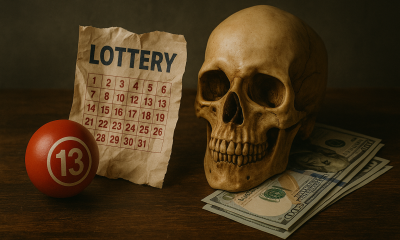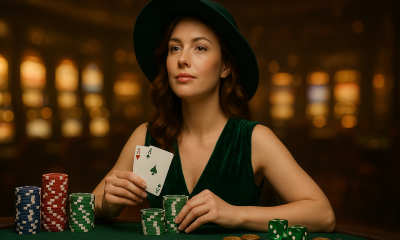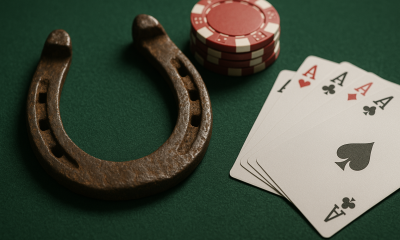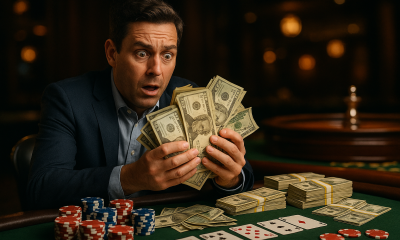Legends
Der rätselhafte Joker: Die mystischen Ursprünge der Wild Card

Der Joker ist eine der eigenartigsten und faszinierendsten Spielkarten. In französischen Kartenspielen sind die Joker die Außenseiter, die weder eine Farbe haben noch einen Rang unter den anderen Karten haben. Der Joker ist eine der wichtigsten Karten in Stich- oder Trumpfspielen. In anderen Spielen kann er jedoch eine recht bunte Reihe von Regeln haben. Er kann die höchste oder die niedrigste Karte sein und in manchen Spielen kann er sogar dazu verwendet werden, den nächsten Spieler aus dem Spiel zu nehmen.
Heutzutage ist der Joker nicht mehr nur in Kartenspielen zu finden. Es gibt Spielautomaten mit dieser Karte als Thema, und sie diente auch als Inspiration für den Batman-Bösewicht Joker. Der Joker hat einen festen Platz in der Popkultur wie keine andere Spielkarte oder Spielausrüstung.
Woher die Joker-Karte kommt
Ein weit verbreiteter Mythos über die Ursprünge der Joker-Karte besagt, dass sie aus dem Tarot stammt. Es wäre sinnvoll, da die Tarot-Decks sind vollgepackt mit Sonderzeichen und scheinbar einzigartigen Karten. Aber das ist nicht der Fall. Der Joker ist eine US-amerikanische Erfindung und kam viel später als Tarot oder die französischen und italienischen Kartenspiele. Im 19. Jahrhundert gab es in den USA zahlreiche beliebte Kartenspiele, darunter POker und Faro im Wilden WestenEs war auch eine Zeit, in der populär Wahrsagespiele wie Ouija gelangten in den Vordergrund der Mainstream-Unterhaltung.
Aber es war Euchre, ein Stichspiel, das den Joker einführte. Ursprünglich wurde kein Joker verwendet, sondern ein 32-Karten-Deck. In den 1850er Jahren entstand jedoch eine Variante mit einer neuen Karte. Der Joker diente als Kommandokarte für die Variante „Euchre mit Joker“. In diesem Spiel war der Joker der „Best Bower“, eine Art Superkarte, die alle anderen Karten schlug.
Die leere Karte bekam schließlich doch ein Gesicht und wurde mit Clowns oder Jokern versehen. Eine brillante Ironie, wenn man bedenkt, dass sie als die mächtigste Karte galt. Euchre war im 19. Jahrhundert das beliebteste Kartenspiel in Amerika. Doch gerade als es an Popularität gewann, geriet es schnell wieder in Vergessenheit. Für die Joker-Karten war dies erst der Anfang.
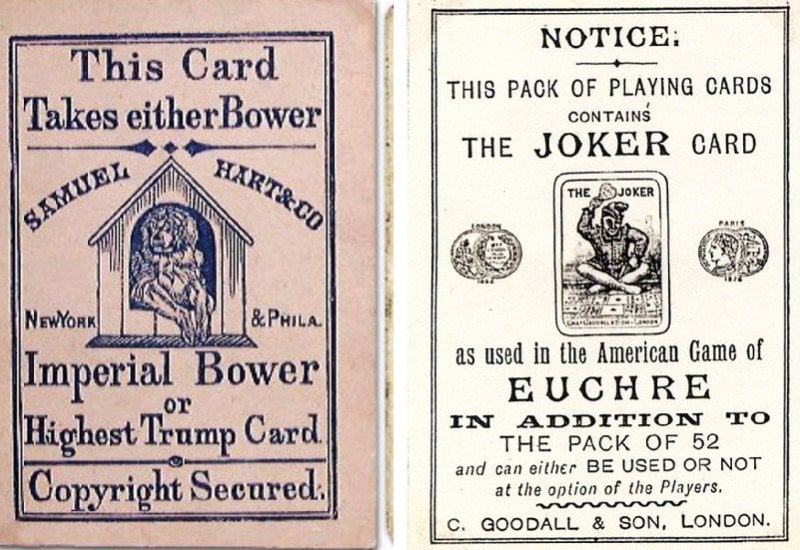
Der Joker und Verbindungen zum Tarot
Der Joker verbreitete sich im 20. Jahrhundert in ganz Europa, und in den 1940er Jahren wurde das 52-Karten-Standarddeck auf 54 Karten mit zwei Jokerkarten erweitert. Kartenspiele wie Rommé, War, Crazy Eights, Canasta und Klondike verbreiteten sich, da Jokerkarten immer mehr zu Standardkartenspielen wurden. Sie waren jedoch nie Teil der Mainstream-Casinospiele. Bis heute werden Joker nicht in Pokerspielen wie Texas Hold'em. Sie kommen auch nicht in Baccarat, Blackjack, Video-Poker und andere klassische Casinospiele.
Diese geheimnisvollen Karten wurden oft verglichen mit Die Narrenkarten in Tarotdecks. Sie haben ähnliche Charaktere und ihre Rollen liegen auch nicht allzu weit auseinander. Im Tarot ist der Narr der höchste Trumpf und kann auch als „Ausrede“ verwendet werden, um eine Farbe zu vermeiden. Die Rolle des Jokers ist meist entweder ein Joker oder die stärkste Karte in einem Deck.
Ausweitung von Joker auf andere Casinospiele
Obwohl der Joker sich nicht als besondere Trumpfkarte in den wichtigsten Casinospielen durchsetzte, hatte er in Spielautomaten eine symbolische Wirkung. Der früheste Spielautomaten der Geschichte waren sehr einfache Spiele, bei denen man mit gleichen Symbolen auf einer festen Gewinnlinie gewinnen konnte. Spielautomaten veränderten sich im 20. Jahrhundert drastisch, und mit ihrer Digitalisierung wurden sie schnell zu den beliebtesten Casinospielen. Joker-Spiele tauchten auf und sind bis heute ein beliebtes Thema bei Spielautomatenspielern. Die einflussreichste Rolle des Jokers bei Spielautomaten war jedoch die Inspiration für die Wild-Symbole.
In Spielautomaten können Wilds jedes andere Symbol ersetzen, um Gewinnlinien zu bilden. Außerdem ersetzen sie nicht unbedingt nur ein Symbol, da sie in den richtigen Szenarien zwei oder mehr Gewinnlinien bilden können. Diese Art von Sondersymbol in den Slots ist ein direkter Einfluss des Jokers in Kartenspielen. In modernen Slots gibt es jede Menge innovative Spieldesigns, die weit über klassische Wilds hinausgehen. Es gibt beispielsweise Sticky Wilds, die für einen zusätzlichen Spin auf den Walzen bleiben, oder Expanding Wilds, die ganze Walzen abdecken. Einige Spiele kombinieren die Rolle von Wilds und Scatters, sodass Sie effektiv eine Bonusrunde auslösen können, wenn Sie genügend Wilds landen.
Die Liste ist endlos, aber der Punkt ist immer derselbe. Der Joker hatte einen massiven Einfluss auf Spielautomaten. Und der Joker ist Teil der Bilder und Symbolik in Casinospielen.
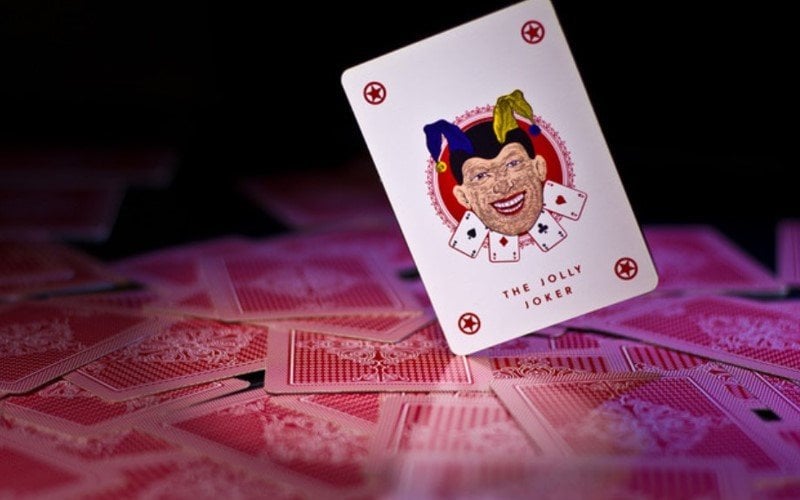
Kultur und Legenden des Jokers
Sie finden ganze Casino-Designs mit Themen um Joker. Oder Bonusaktionen, die mit Jokersymbolen oder -symbolen umrahmt sind. In Spielerkreisen hat der Joker eine tiefe symbolische Bedeutung. Er symbolisiert Geheimnis, Veränderung, etwas Besonderes oder etwas sehr Mächtiges.
Die Joker-Karten dienten auch Jerry Robinson als Inspiration, einem der Autoren, die den Batman-Bösewicht schufen. Robinson erklärte, eine Skizze einer Joker-Spielkarte aus dem Jahr 1940 habe ihm als Grundkonzept für die Figur gedient. Wie die Spielkarte selbst ist auch die Figur des Jokers unberechenbar, geheimnisvoll und ein echter Sonderling.
Diese Karten faszinierten auch Zauberer und Trickster. Sie konnten im Mittelpunkt magischer Darbietungen stehen und als Metapher für etwas Chaotisches und Unverständliches dienen. Es gibt auch Sammler dieser Karten. Jokerkarten sind selten, und kein Hersteller kann sie exakt gleich herstellen. Die meisten Kartendecks enthalten zwei Joker, einen roten und einen schwarzen. Manche Decks enthalten jedoch nur einen Joker, während andere Joker mit besonderen Motiven oder alternativen Farben anbieten. In Sammlerkreisen konnten diese Karten zu begehrten Talismanen werden.
Warum der Joker in anderen Casinospielen nicht verwendet wird
In gewisser Weise ist es kein Wunder, dass Joker in den meisten Echtgeld-Casinospielen nicht enthalten sind. Und das liegt nicht daran, dass die meisten Tischspiele in einem Casino älter sind als der Joker. Es liegt daran, dass diese Casinospiele sorgfältig berechnet den Spielern faire Gewinnchancen zu bieten, sondern auch den Haus einen leichten Vorteil. Sicher, es gibt Varianten von Blackjack oder Baccarat, die die Dynamik ein wenig aufmischen. Aber mehrere Hände beim Blackjack zu haben, oder Baccarat ohne Provision dreht den Spieß nicht um, sondern bringt eher einen Joker ins Spiel.
Es ist nicht so, dass sie den Spielen kein neues Element hinzufügen würden oder dass die Spieler die Joker im Kartenspiel nicht bemerken würden. Aber um solch eine chaotische und unberechenbare Karte in diese Klassiker einzuführen, müssten die Casinos die ursprünglichen Spiele praktisch umstrukturieren. Stellen Sie sich vor, Sie hätten einen Joker in BlackjackWas würde es tun? Würde es eines der folgenden Dinge tun:
- Sofortiges Blackjack
- Verdoppeln Sie den Einsatz
- Überspringen Sie die Ziehung des Dealers
Es wäre eine ziemliche Enttäuschung, ihn einfach als weiteres Ass oder als beliebige Nebenkarte zu verwenden. Die Symbolik des Jokers und seine Bedeutung für die Spieler weckt höhere Erwartungen an diese Karte. Unterm Strich passt der Joker nicht wirklich in Standard-Casinospiele, da er zu sehr eine Sonderkarte ist.
Sie können es nicht einschmuggeln und als Ass oder „1“ abschreiben. Sie können es auch nicht als Sofortgewinnkarte hinzufügen, da dies bedeuten würde, dass das Casino die Auszahlungstabellen und andere Aspekte des Spiels neu arrangieren, um den Hausvorteil wiederherzustellen. Chaotisch, um es gelinde auszudrücken.
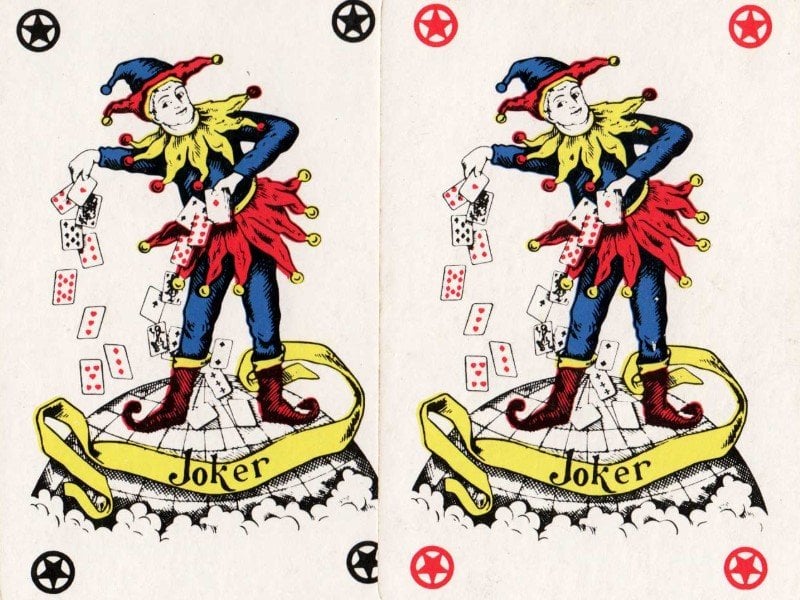
Superkarten und Illusionen
Der Joker hat etwas Geheimnisvolles an sich, das sich nicht abschütteln lässt. Vielleicht liegt es an den mysteriösen Ursprüngen der Karte in einem praktisch ausgestorbenen Spiel. Oder daran, dass der Joker in so vielen verschiedenen Spielen eine so große Rolle spielt. All dies hat dazu beigetragen, riesige Legenden und Mythen um die scheinbar harmlose Spielkarte zu schmieden. Für manche ist er die Siegerkarte, die alle anderen schlägt und das Spiel gewinnt. Eine Superkarte, wenn man so will, die das größte Comeback schaffen kann und das Haus schlagen auf einmal.
In jedem Fall verleiht es der Karte eine fast abergläubische Aura In Spielerkreisen. Man kann neue Spiele rund um den Joker erfinden und sogar eigene Varianten beliebter Casinospiele entwickeln, aber mit dem Joker. Die Karte scheint die Fähigkeit zu haben, den Spielverlauf komplett zu verändern. Doch wenn wir die Illusion und die Legenden beiseite lassen, wie groß ist die Wirkung tatsächlich?
Wenn Sie eine Standardkarte mit 54 Karten nehmen, gibt es nur 2 Joker zum Ziehen. Wenn Sie spielen Runden Baccaratund 5.5 Karten pro Spiel ziehen, siehst du die Joker-Karte im Durchschnitt nur einmal alle 5 Spiele. Sie erscheint nicht so regelmäßig, wie du vielleicht denkst, und die Chancen sind noch geringer, wenn du mehr Decks verwendest, und die Händler wird ab und zu neu gemischt. Vielleicht handelt es sich um eine überbewertete Karte, in die die Spieler zu große Hoffnungen setzen oder deren Einfluss auf das Spiel übertreiben.
Joker-Äquivalente in Casinospielen
Am einfachsten lässt es sich vielleicht anhand von Casinospielen mit Jokern und anderen speziellen Bonusrunden oder Symbolen beschreiben. Manche Spieler setzen einfach zu viel Hoffnung in die Wilds oder die Bonusrunden. Sicher, sie können beträchtliche Gewinne einbringen und zahlreiche Auszahlungen sichern. Aber sie kommen nicht häufig vor und in vielen Fällen zahlen sie nicht die X-te Walzenanzahl aus, die Sie zum Erreichen dieser Punkte benötigen. Genau wie bei allen anderen Sonderregeln, Nebenwetten, Erfolgsbelohnungen oder sogar Jackpots. So reizvoll diese Karten auch sein mögen, Sie sollten sich nicht von ihnen einschüchtern oder in die Irre führen lassen. Casinospiele können Jackpots und spezielle Charaktere oder Karten haben. Aber letzten Endes sind dies kalkulierte Risiken, die das Casino eingeht. Und es wird diese Sonderkarten nicht auf Kosten seines Hausvorteils anbieten.
Wenn Sie also das nächste Mal Joker-Slots spielen oder auf eine besondere Nebenwette oder einen exklusiven Jackpot stoßen, denken Sie an die Lektion hinter dem Joker. Casinospiele sind nicht abergläubisch und bieten Ihnen keine Karte, mit der Sie das Blatt wenden können. Die symbolische Bedeutung überwiegt auf lange Sicht definitiv die Gewinnchancen. Spielen Sie also vorsichtig und fantasieren Sie nicht zu sehr über diese symbolischen Spielelemente. Genießen Sie sie einfach als das, was sie sind – etwas Außergewöhnliches und eine faszinierende Ergänzung für jedes Spiel.
